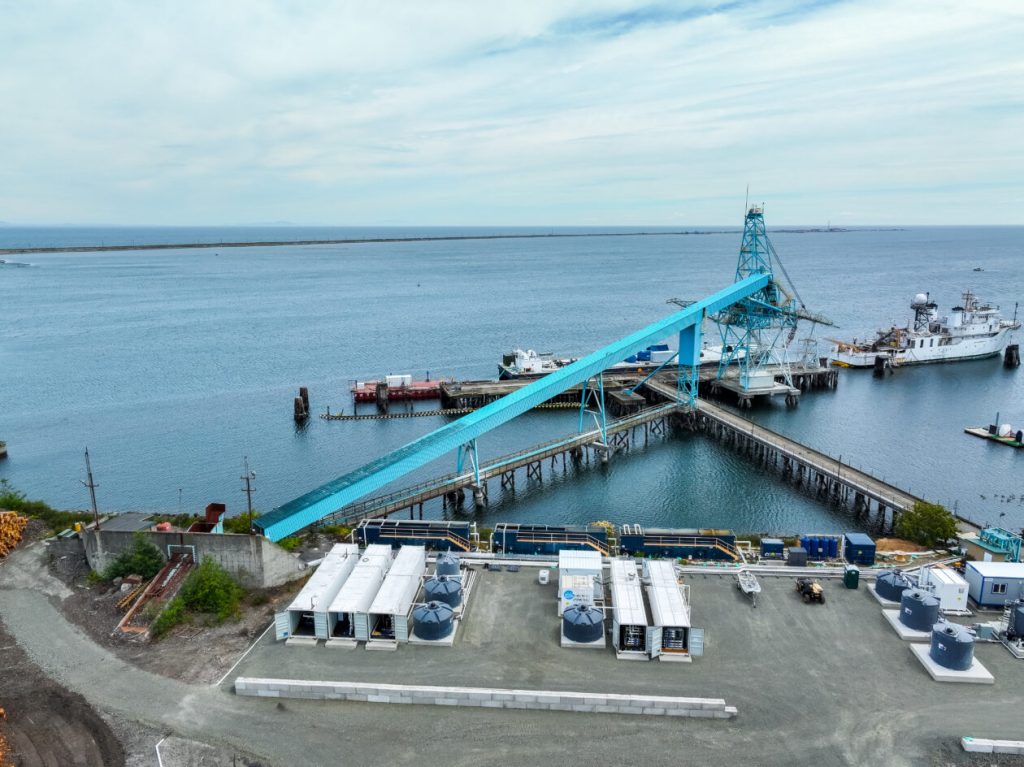Ebb Carbon’s Pioneering Marine Carbon Removal Project Makes Waves in Washington State
In a significant step forward for climate technology, Ebb Carbon has launched an innovative marine carbon removal demonstration project in Port Angeles, Washington. Named Project Macoma, this pilot initiative represents a promising approach to addressing both ocean acidification and atmospheric carbon dioxide levels simultaneously. By leveraging electrochemical processes to create more alkaline seawater, Ebb Carbon’s technology enables the ocean to safely capture and store carbon while mitigating the harmful effects of acidification on marine ecosystems. The project, situated at the Port of Port Angeles on the Strait of Juan de Fuca, aims to remove and store up to 250 tons of carbon annually during its operational period through spring 2026. This demonstration follows two years of rigorous testing in nearby Sequim Bay, conducted in partnership with the Department of Energy’s Pacific Northwest National Laboratory, with peer-reviewed results confirming both the safety and effectiveness of the approach.
“With Project Macoma, we’re proud to be creating a blueprint for how safe and responsible carbon removal can advance global climate goals while protecting local marine health,” stated Ebb Carbon CEO Ben Tarbell. The company acknowledges that this effort represents an important learning stage that will help establish the foundation for scaling the technology to its ultimate goal of removing gigatons of CO2. Founded four years ago and headquartered in South San Francisco, Ebb Carbon has secured $40 million in investment funding and currently employs 22 people. The startup’s approach has already attracted significant corporate interest, notably from Microsoft, which signed a carbon removal agreement with Ebb Carbon last year. This deal commits to funding the removal of 1,333 tons of carbon with options to increase this amount, potentially locking away up to 350,000 tons of CO2 over the next decade.
The Pacific Northwest has emerged as a hub for carbon removal innovation, with several companies developing diverse technological approaches to address the climate crisis. Alongside Ebb Carbon, organizations such as Svante, Banyu Carbon, CarbonQuest, Myno Carbon, and Solid Carbon are advancing various carbon capture and removal strategies. The sector has seen substantial investment activity, exemplified by oil and gas giant Occidental’s acquisition of British Columbia-based Carbon Engineering for over $1 billion two years ago. This growing ecosystem of carbon removal enterprises reflects increasing recognition of the critical role these technologies may play in meeting climate goals, particularly for addressing emissions that are difficult to eliminate through conventional means.
While carbon removal technologies have faced skepticism regarding their scalability and potential impact, scientific consensus has increasingly acknowledged their necessity. The UN Intergovernmental Panel on Climate Change (IPCC) addressed this directly in its April 2022 report, stating: “The deployment of carbon dioxide removals to counterbalance hard-to-abate residual emissions is unavoidable if net zero…emissions are to be achieved.” This represents a significant shift in the climate conversation, as experts recognize that even with aggressive emissions reductions, certain sectors will continue to produce unavoidable carbon outputs that must be countered through removal strategies. Ebb Carbon’s ocean-based approach offers particular promise by addressing multiple environmental challenges simultaneously.
What sets Ebb Carbon’s technology apart is its dual environmental benefit. By electrochemically altering seawater chemistry to make it more alkaline, the process not only enhances the ocean’s natural carbon sequestration capacity but also helps combat ocean acidification – a critical threat to marine life worldwide. Ocean acidification occurs as seawater absorbs atmospheric carbon dioxide, creating carbonic acid that can impair shell formation in numerous species and disrupt marine food webs. The technology effectively reverses this process locally, creating conditions that benefit marine organisms while removing carbon from the broader carbon cycle. This approach leverages the ocean’s vast carbon storage potential in a way that supports rather than harms marine ecosystems.
Project Macoma represents an important milestone in the evolving landscape of climate solutions, demonstrating how innovative approaches can potentially address multiple environmental challenges simultaneously. As Ebb Carbon moves forward with this demonstration, the company is gathering crucial operational data that will inform future scaling efforts. While the current project’s 250-ton annual carbon removal capacity is modest relative to global emissions, it serves as a vital proof-of-concept for a technology that could eventually operate at much larger scales. The coming months will provide valuable insights into the practical application of this ocean-based carbon removal approach, potentially opening new pathways for addressing the climate crisis. As the IPCC and other expert bodies have recognized, carbon removal technologies like Ebb Carbon’s will likely form an essential component of any comprehensive strategy to achieve net zero emissions and stabilize our climate.


